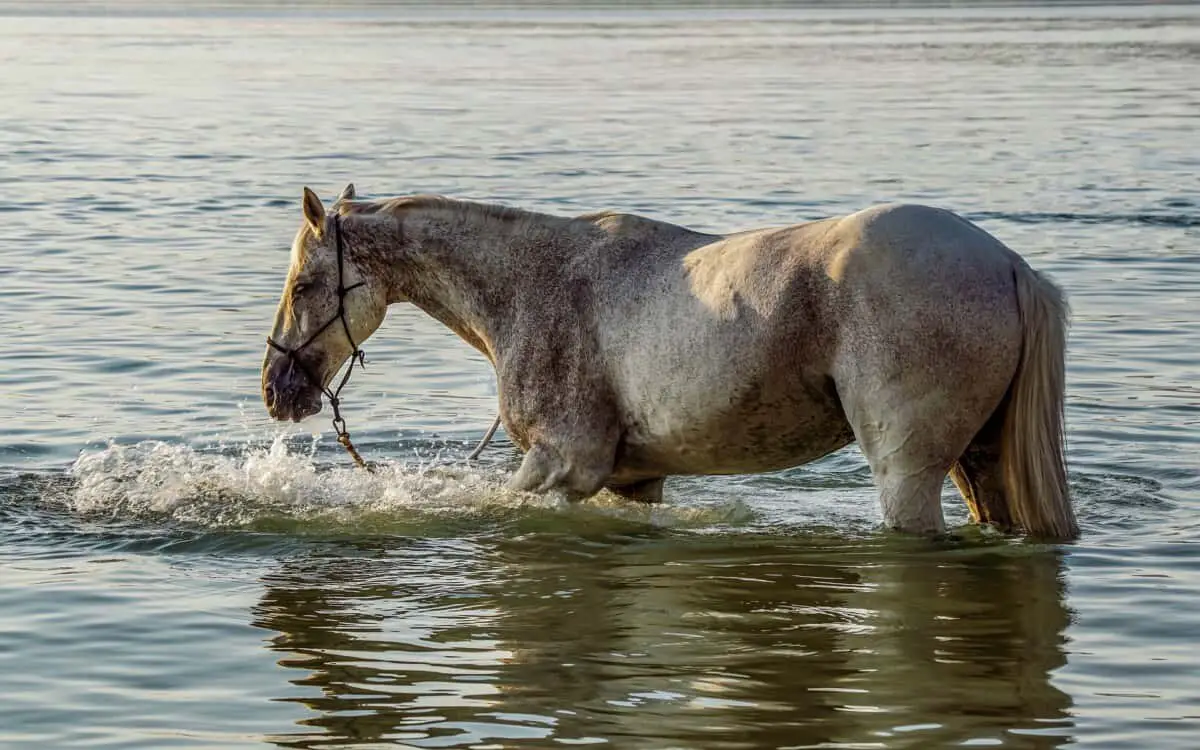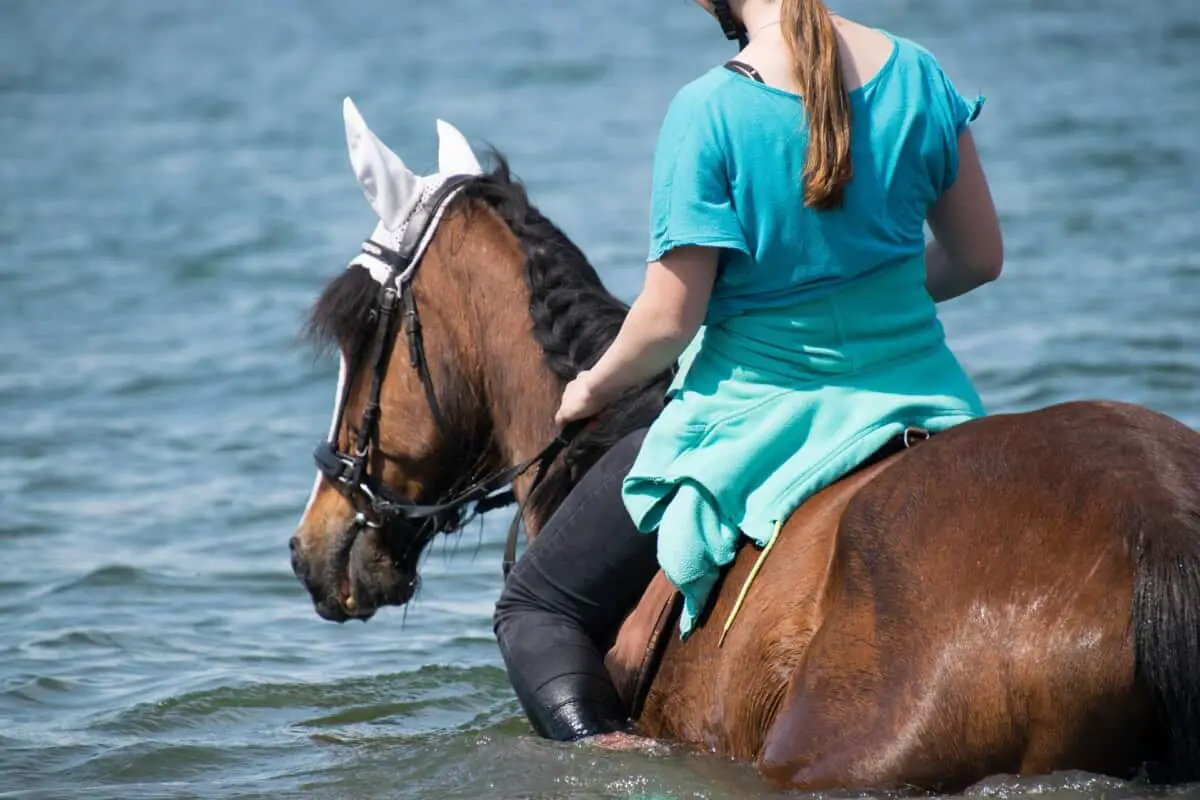Skip To Section
It depends. Like humans, horses can sink if they don’t know how to swim. While most horses can stay afloat pretty well, this shouldn’t be mistaken to mean that horses naturally are great swimmers even without prior training.
If you love horses and swimming, you may have thought of taking your horse for a swim or even for the sole purpose of fitness and rehabilitation. But this is never a good idea unless you have an experienced horse that knows how to swim.
You need to consider the fact that horses can sink. Horses also have a hard time turning in water. In fact, your horse can keep moving forward despite your best efforts to try to get your horse to move and make a turn.
This can also increase drowning risks, which will ultimately scare your horse from wanting to learn how to swim. If your horse hasn’t been through a swimming or floating lesson or they are too nervous about getting inside water, it’s not advisable to make them swim.
Wild horses couldn’t live their entire lives in the wild without getting into the water. These types of horses naturally engage with water regularly. However, horses that aren’t from the wild don’t have the same instincts or capabilities when it comes to swimming.
Horses may, therefore, be among those animals that are genetically predisposed to swim. But it’s not advisable to introduce swimming suddenly without unlocking your horse’s genetic potential.
Your horse’s first experience with water is critical, and you need to slowly introduce them to the idea of being in the water. Allow them to stand and walk around at their own pace and never ride them into deep water until your horse is fully trained and comfortable with that concept.
Do Horses Like To Swim? Are Horses Good Swimmers?
Like people, some horses seem to love swimming while others don’t. Many different types of horses can become good swimmers once they become accustomed to the water.
But keep in mind, horses cannot hold their breath underwater, and you should never take your horse where there are big waves. This can be very dangerous and cause your horse a lot of unnecessary trauma.
It is also not recommended to ride your horse in the water if it is windy out. The water that gets blown in their face or causes their head to be submerged in the water can cause many issues, including water in their ears.

Teaching A Horse To Swim
If you want to get your horse into the water during the hot summer, you’ll need to teach him/her how to swim better. As mentioned above, horses may be genetically predisposed to swimming; however, they need a progressive introduction.
You should start with shallow water to allow your horse to get comfortable with the idea of swimming, which can be an excellent exercise for horses.
Never guide your horse into deep water or attempt to force a swimming lesson. You can begin by visiting a shallow pond and try riding him/her in water that is at most 2 feet deep. Once he/she is used to this depth, you can venture deeper.
As you introduce your horse to deeper water, ensure there are no big stones underneath. You can do test runs on your own to make sure your horse doesn’t trip on rocks.
However, before allowing your horse to venture into the deeper water, let them stand momentarily in the water until they are comfortable. You should watch out for signs of nervousness, like abrupt movements coupled with awkward stops.
When your horse is comfortable, you can venture deeper. Make sure you are in front of him/her to avoid being kicked as they may try to push forward inside the water. Also, remember to teach your horse how to turn while in water.
When your horse becomes familiar with the water around them, their natural swimming instinct will “kick in.” Since they are heavy, you’ll only see their head when they are swimming, similar to when larger dogs swim.
Their entire body will be submerged, and you’ll only be able to see their head. If you look underneath, he/she will be busy paddling with their legs, just like how dogs swim.
In fact, horses look like they are running if you watch them swimming from underwater. But this happens over time when a horse gets comfortable in the water and learns how to swim.
Tip: It’s advisable to guide your horse using a rope initially before he/she knows how to swim.

Is It Safe To Ride A Swimming Horse?
It can be dangerous and hard to ride a horse that is swimming. Since horses make different movements from those made when riding, your chances of slipping and falling are higher. What’s more, horses tend to be more focused on swimming than the rider, which poses serious risks.
It’s difficult to predict a horse’s movement while they are swimming. Your horse is likely to make unexpected and/or rapid movements that pose serious risks.
There’s also the risk of being kicked if you fall off your horse’s back while he is swimming. While a horse kick underwater may not be as lethal as one on land, it can injure you seriously, making it impossible for you to swim.
You can also float away if you attempt to ride a swimming horse. If you don’t know how to swim, don’t try to ride a horse in any type of water. If your horse’s head is the only part of its body above the water, your chances of drowning are higher if you don’t know how to swim.
What To Do When Riding A Swimming Horse
If you must ride a swimming horse, there are some precautions you can take.
First and foremost, don’t push your horse downwards into the water. Horses can’t breathe underwater and will most probably get nervous making erratic movements and push you off his/her back.
Instead, you should swim as well to avoid exerting undue pressure on your horse. This is better than clamming on his/her neck and making them nervous.
You should also swim for short periods at a time. As mentioned above, horses are not meant to swim. They tend to get tired faster underwater, much more so than humans.
How Long Can Horses Swim?
To avoid tiring your horse and running the risk of allowing them to sink, don’t subject your horse to swimming for more than 10 minutes at a time. It is also best to exit the water before you and your horse gets tired of swimming.
If you happen to get off your horse’s back and start swimming beside them, be absolutely certain to stay away from their kicking legs. This can be extremely dangerous because a horse that kicks you underwater can be lethal.
Note: Avoid swimming around your horse because this tends to make them nervous and could cause them to make unnecessary movements that could tire them even faster.
Do Horses Enjoy Being In Water?
This is a tricky question because, just like humans, some horses might love splashing around in the water while others might be terrified of it.
You obviously can’t ask your horse how they feel about being in the water, but there are sure signs that will allow you to understand how your horse is adapting to the experience.
You’ll be able to see in their behavior whether they are enjoying the water or if they are hesitant to go near or in it.
When you guide your horse to water, make sure you don’t immediately head for the deeper water. Your horse’s head should never be submerged, and don’t ever push your horse to go somewhere they don’t want to go.
Give your buddy a chance to adapt by walking in shallow water and allowing them to explore the idea of being wet. This will give you a good indication as to whether or not your horse enjoys being in the water.
Unlike horses that have lived in the wild, your horse might not enjoy deep water because they are not a good swimmer.
Everybody thinks that horses can naturally swim and that you can immediately ride a horse into the ocean. However, that is just not the case, and every horse is different when it comes to whether or not they enjoy swimming.
Some horses, such as wild horses, will playfully paw at the water before rolling over in it. If your horse starts pawing at the water, you should make them stop immediately.
Riding a horse in water that begins to paw at it can be extremely dangerous for the rider. If that horse flips with you on it, you can get severely injured and even drown.
So always make sure you stop your horse from pawing at water regardless of how cute it looks!
Do Horses Need To Swim?
No. While horses need exercise, they can get all the training they need running or doing other ground exercises. However, if you want to expose your horse to various activities, swimming can be a good alternative when properly introduced.
Since horses rely heavily on their legs when swimming, this can be a great leg exercise. Swimming can also strengthen your horse’s core muscles and improve his/her overall fitness.
In fact, swimming is common among horses with injuries because this type of exercise can heal serious injuries and boost muscle growth.
Summary
Like humans, horses must learn how to swim first before taking them out into deep waters for the first time. You should also ensure you know how to swim if you plan on riding him/her while they are in the water.
Keep in mind that there are many risks associated with horses and water. If your horse begins to panic, it may forget about you and head in a different direction. So always be alert!
The importance of teaching your horse how to swim can be the difference between having a happy horse who is comfortable strolling along the coast or having a companion that is terrified of water.
